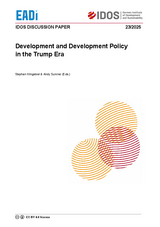Transactional multilateralism: how Trump plays into China’s hands
Haug, SebastianManuskripte vertraulich (2025)
in: Stephan Klingebiel / Andy Sumner (eds.), Development and development policy in the Trump era, Bonn: German Institute of Development and Sustainability (IDOS), 40-44
DOI: https://doi.org/10.23661/idp23.2025
At the United Nations (UN), as elsewhere, Donald Trump and his administration frame China as the ultimate rival. Yet, as suggested in this paper, Trump’s actions and approach vis-à-vis the UN system are set to ultimately – and unintentionally – play into Beijing’s hands. First, the withdrawal of the United States from individual UN bodies opens up concrete spaces for expanding China’s multilateral weight. Second, a more general disengagement by the United States from the UN system contributes to what Chinese sources refer to as a broader shift from a “US-centred” to a “UN-centred” world where Western hegemony is replaced by increased weight for the UN’s developing-country majority, with China as the latter’s de facto leader. Third, and despite obvious rivalries, Trump shares Xi Jinping’s disdain for more autonomous multilateral bodies and aligns with China’s more transactional approach to the UN. This does not bode well for those committed to a more substantive idea of UN multilateralism that centres on a stable international bureaucracy with a strong normative compass. For Beijing, Trump 2.0 suggests that the shift from a “US-centred” to a “UN-centred” world – where a more transactional approach to multilateralism and the increased weight of developing countries turn China into the central global player – is well underway.


